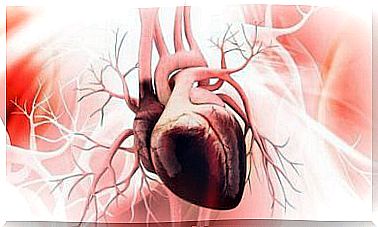Hypervitaminosis: An Excess Of Vitamins

Hypervitaminosis is a rare condition caused by an excess of vitamins in the body. This problem usually does not lead to a harmful effect on health.
However, when vitamin concentrations exceed the body’s needs and are not excreted through the urinary tract, they can cause both shock and harmful metabolic toxicity.
What are vitamins?
Vitamins are complex organic substances that activate various functions in the body. Their assimilation is necessary in small quantities, which is why we also know them as micronutrients.
The body does not make most vitamins on its own, except for D, K, B1, B2 and folic acid. In addition, certain vitamins cannot be stored. Therefore, vitamins must be taken daily through food.
Each of the vitamins performs a function that is both unique and irreplaceable in the metabolic processes of the organism. In this way, both a shortage and an excess of these substances will affect the metabolic processes of the body. Below we will take a closer look at the most common types of hypervitaminosis.

Hypervitaminosis of Vitamin A
Hypervitaminosis A refers to an excessive supply of vitamin A in the body, also known as retinol. The main cause of this condition is the misuse of vitamin supplements.
Instead of talking to a doctor about it, many people self-medicate without knowing what the consequences might be. Among the adverse effects of these supplements, we can highlight the following issues:
- Fetal defects: A pregnant woman should be extremely careful with vitamin supplements and control the intake of this vitamin. It is especially dangerous during the first trimester of pregnancy.
- liver problems.
- Changes in the central nervous system.
- The decrease in bone density.
In addition, the symptoms and problems of someone suffering from this condition vary from person to person. Below is a list of some of the most typical symptoms:
- Anorexia and Weight Loss
- Nausea and vomiting
- amenorrhea
- Increased susceptibility to infection
- Insomnia
- Irritability
Another characteristic sign that does not pose a health hazard is hypercarotenosis. It consists of an excess of carotenes which then deposit under the skin and cause a yellowish color to the palm.
Hypervitaminosis of Vitamin D

Vitamin D hypervitaminosis is rare. However, it can be caused by overuse of supplements. While sunbathing is the best-known way to make vitamin D, hypervitaminosis D is highly unlikely, no matter how much sun exposure you get.
Nor is the intake of foods rich in this vitamin a common cause, other than an extreme excess of fish oil. Therefore, as with vitamin A, the cause of this condition is usually the abuse of vitamin supplements. Today, some tables indicate the maximum allowable amounts of vitamins for our body.
There are two very characteristic symptoms of this condition, which are hypercalcemia and calcinosis. We will explain these issues below:
- Hypercalcemia: It consists of a sharp increase in the calcium levels in the blood. This situation leads to a different set of symptoms, such as nausea, vomiting, mental changes, loss of appetite and weight, kidney stones, and joint and muscle pain.
- Calcinosis: This term refers to the formation of calcium and phosphate deposits in soft tissues such as the skin and kidneys.
Hypervitaminosis of Vitamin E
Like the other two cases, the use of vitamin E in vitamin supplements is the main cause of this condition. For this reason, you should not take or administer vitamins without the supervision of a doctor or nutritionist.
Although it can also cause hypervitaminosis, vitamin E has been considered safe in high doses since its discovery. However, if the dose exceeds 800 IU, symptoms such as the following may occur:
- Diarrhea
- Fatigue
- High bloodpressure
- liver problems
- Bleeding
- Decreased resistance to, among other things, bacterial infections
Conclusion
Hypervitaminosis is uncommon. In addition, the main cause of this is the misuse of vitamin supplements. For that reason, it is fundamental to follow the recommendations of a doctor or nutritionist.
Finally, hypervitaminosis of water-soluble vitamins is not common, as the body eliminates these excesses through sweat or urine. However, this is not the case with fat-soluble vitamins, which accumulate in the body and can lead to the aforementioned conditions.









